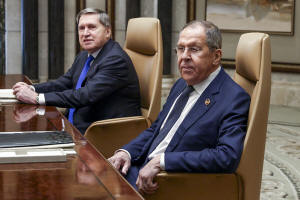A deeper look at the talks between US and Russian officials as Trump
suggests Ukraine is to blame
 Send a link to a friend
Send a link to a friend
 [February 19, 2025]
By MATTHEW LEE and VLADIMIR ISACHENKOV [February 19, 2025]
By MATTHEW LEE and VLADIMIR ISACHENKOV
RIYADH, Saudi Arabia (AP) — Top U.S. and Russian officials had their
most extensive high-level engagement since Moscow sent troops into
Ukraine almost three years ago, meeting for four hours Tuesday before
President Donald Trump suggested that Kyiv was to blame for the
conflict.
Trump showed little patience for Ukraine’s objections to being excluded
from the talks in Saudi Arabia. He said repeatedly that Ukraine’s
leaders never should have allowed the conflict to begin, indicating Kyiv
should have been willing to make concessions to Russia before it sent
troops into Ukraine in 2022.
“Today I heard, ‘Oh, well, we weren’t invited.’ Well, you been there for
three years. You should have ended it three years” ago, Trump told
reporters at his Florida residence. “You should have never started it.
You could have made a deal.”
Such comments and Trump's goal of mending ties with Moscow may come at a
cost to the transatlantic alliance of the U.S. and Europe and
significantly damage Washington’s standing with Ukraine as well as with
other nations counting on U.S. leadership in NATO and elsewhere for
their security and protection.
During former President Joe Biden's administration, the U.S. and Europe
focused on isolating Russia and defending the post-World War II
international order.
In Riyadh, the delegations led by U.S. Secretary of State Marco Rubio
and Russian Foreign Minister Sergey Lavrov agreed to set up teams to
look into restoring staffing at the U.S. and Russian embassies in Moscow
and Washington that have been decimated by a series of tit-for-tat
diplomatic expulsions.

The effort is aimed at using those channels to support Ukraine peace
negotiations and to explore ways to restart economic and global
cooperation. A Russian official pointed to possible joint energy
ventures.
Here’s a look at the meeting and what comes next:
Reestablishing tattered diplomatic relations
First on both countries' list of accomplishments was an agreement to end
what has been years of dwindling diplomatic relations that hit a
post-Cold War low point after Russian President Vladimir Putin sent
troops into Ukraine in February 2022.
The meeting, which came just a week after Trump spoke to Putin by phone,
was the first substantive face-to-face discussion between the nations’
top diplomats since former Secretary of State Antony Blinken met Lavrov
in Geneva in January 2022 in an unsuccessful bid to prevent the Ukraine
conflict.
Lavrov said after Tuesday's talks that the sides agreed to fast-track
the appointment of new ambassadors, adding that senior diplomats from
the two countries will meet shortly to discuss specifics related to
“lifting artificial barriers to the work of the U.S. and Russian
embassies and other missions.”
In reality, the decimation of the U.S. and Russian embassies' personnel
began well before Russian troops rolled into Ukraine in 2022, starting
after 2014 Russia’s annexation of Crimea. That was seen as illegal by
most of the world during the Obama administration, which ordered several
Russian offices in the U.S. to close.
It picked up steam after the 2018 poisoning in Britain of an exiled
Russian spy and his daughter, which British authorities blamed on
Russia, and which resulted in mass expulsions of diplomats and the
closure of numerous consulates in both countries and Europe.
Asked by The Associated Press if the U.S. now considered those cases
closed, Rubio declined to say but said it would be impossible to get a
Ukraine peace agreement without diplomatic engagement.

“I’m not going to negotiate or talk through every element of the
disruptions that exist or have existed in our diplomatic relations, on
the mechanics of it,” he said. Bringing an end to the conflict cannot
happen “unless we have at least some normalcy in the way our diplomatic
missions operate in Moscow and in Washington, D.C."
Negotiating an end to the conflict in Ukraine
The two sides agreed to set up high-level working groups to begin
exploring a negotiated end to the conflict. It was not immediately clear
when these teams would first meet, but both said it would be soon.
[to top of second column]
|

Russian Foreign Minister Sergei Lavrov, right, sits next to Russian
President Vladimir Putin's foreign policy advisor Yuri Ushakov
during a meeting with U.S. Secretary of State Marco Rubio, U.S.
National Security Advisor Mike Waltz and U.S. Middle East envoy
Steve Witkoff, Saudi Foreign Minister Prince Faisal bin Farhan Al
Saud and Saudi National Security Advisor Mosaad bin Mohammad Al-Aiban,
at Diriyah Palace, in Riyadh, Saudi Arabia, Tuesday, Feb. 18, 2025.
(Evelyn Hockstein/Pool Photo via AP)

As to concessions that may need to be made by all sides, Trump’s
national security adviser, Mike Waltz, who participated in the talks
Tuesday, said the issue of territory and security guarantees would be
among the subjects discussed.
Rubio said a high-level team, including experts who know technical
details, will begin to engage with the Russian side on “parameters of
what an end to this conflict would look like.”
On the key issue of a prospective peacekeeping mission to monitor a
potential ceasefire in Ukraine, the top Russian diplomat said Moscow
would not accept any troops from NATO members, repeating its assertion
that Ukraine's bid to join the Western military alliance poses a major
security issue.
“We explained that the deployment of troops from the countries that are
NATO members, even if they are deployed under the EU or national flags,
will not change anything and will certainly be unacceptable for us,”
Lavrov said.
Exclusion of Ukraine and Europe from the talks
Neither Ukraine nor European nations were invited to Tuesday's talks in
Riyadh, but U.S. officials said there is no intention to exclude them
from peace negotiations should they begin in earnest.
“No one is being sidelined here,” Rubio said. "Obviously, there’s going
to be engagement and consultation with Ukraine, with our partners in
Europe and others. But ultimately, the Russian side will be
indispensable to this effort.”
Waltz agreed: “If you’re going to bring both sides together, you have to
talk to both sides. ... We are absolutely talking to both sides.”
He noted that Trump spoke with Ukrainian President Volodymyr Zelenskyy
immediately after speaking with Putin last week and that U.S. Vice
President JD Vance and Rubio met Friday with Zelenskyy in Germany.
Still, Zelenskyy was clearly peeved at being omitted from the meeting,
postponing plans to visit Saudi Arabia on Wednesday to avoid any linkage
of his trip with Tuesday's U.S.-Russia talks.
And that was before Trump's comments suggesting Kyiv was at fault in
starting the fighting.

“This whole negotiation from the start seems very tilted in Russia’s
favor. And it’s even a question whether it should be termed a
negotiation or in some sense, a series of American capitulations,” said
Nigel Gould-Davies, senior fellow for Eurasia and Russia at the
International Institute for Strategic Studies in London and a former
British ambassador to Belarus.
Possible lifting of US sanctions against Russia
Asked whether the U.S. could lift sanctions against Moscow imposed
during the Biden presidency, Rubio noted that “to bring an end to any
conflict, there has to be concessions made by all sides” and “we’re not
going to predetermine what those are.”
Asked if the U.S. could officially remove Lavrov from its sanctions
list, Rubio said that “we’re just not at that level of conversation
yet."
Potential US-Russian cooperation
Kirill Dmitriev, head of the Russian Direct Investment Fund who joined
the Russian delegation in Riyadh, told reporters that Russia and the
U.S. should develop joint energy ventures.
“We need joint projects, including in the Arctic and other regions,” he
said.
Should the parties succeed in negotiating an end to the Ukraine
conflict, Rubio said, it could open “incredible opportunities" to
partner with the Russians "on issues that hopefully will be good for the
world and also improve our relations in the long term.”
He did not say what those would entail.
___
Isachenkov reported from Moscow. Associated Press Writer Emma Burrows in
London and Jonathan J. Cooper in Phoenix contributed to this report.
All contents © copyright 2025 Associated Press. All rights reserved |